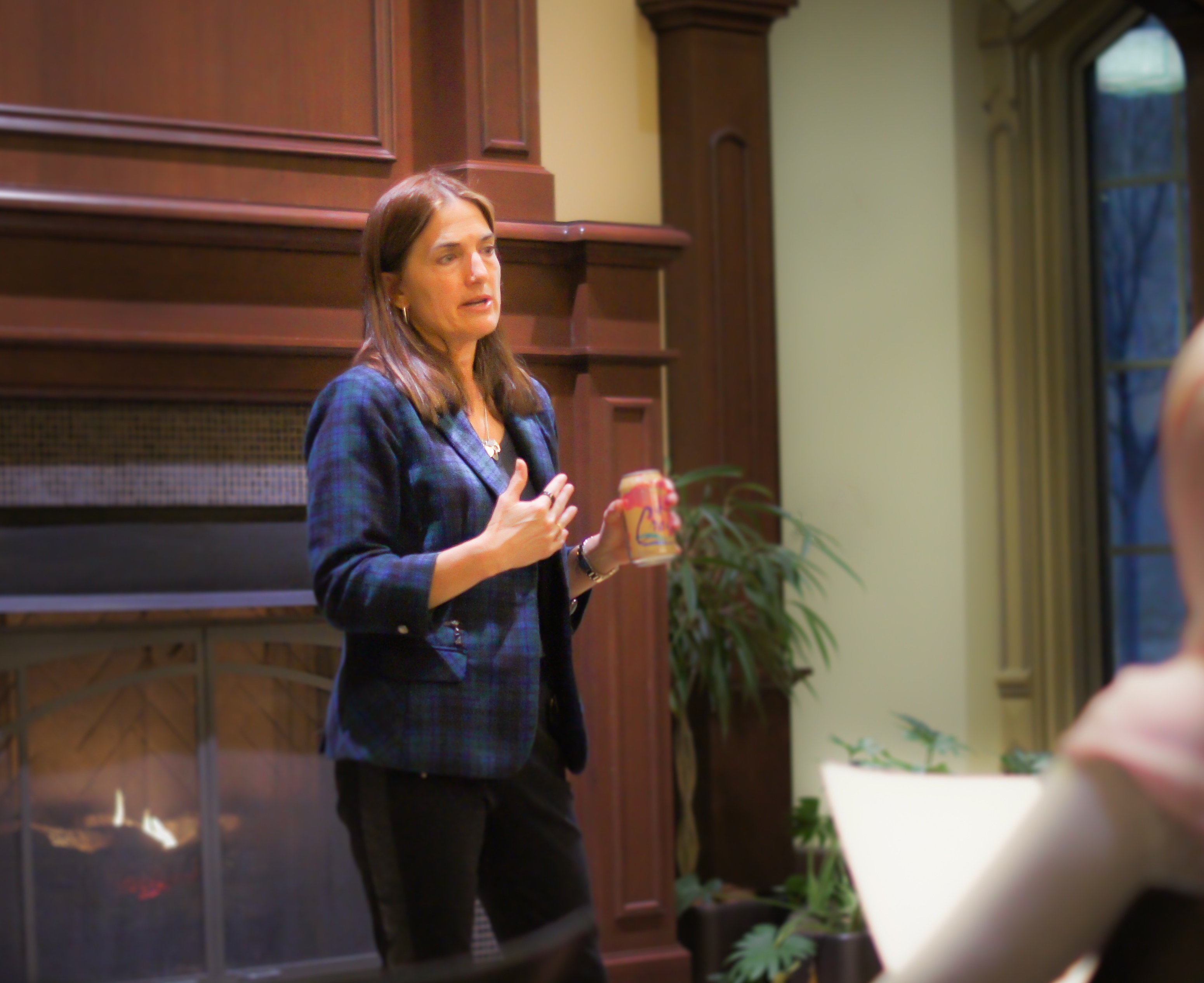Expect the Unexpected, Avoid the Winner’s Vortex
I'm writing this blog the day after my alma mater's (University of Notre Dame) stunning loss to Northwestern. No one expected Northwestern to win. My son Daniel, a sophomore at Northwestern, met me and my husband in South Bend for some in-person-intra-family football trash talk. Even Daniel deemed the game an impossible long shot for the Wildcats. My dread at the field goal that set the game into overtime was only partially offset by his giddiness. The thrill of an underdog upset (if you're the underdog), is one of life's gems. I remember feeling that way a few weeks ago, right before the official called back ND's touch down in the FSU game. The experience of ND's loss combined with other events this week amplified a question in my mind. Does depression in high achievers happen because success steals the possibility of an underdog upset? 
With the constant expectation of success, winning becomes a no-win proposition. If you win, great, you should. If you lose, you're not just a failure but an underachiever. One of the reasons most of us love sports is because on any given day, any team can win. Unfortunately, we all get sucked into the winner's vortex: the more a team wins, the more every win becomes expected. In my work in mental health advocacy, I see this reflected not just with college sports teams, but with college students. The admission to elite schools has become so competitive that failure, critical for resilience, is often not an option in high school. In result, we have thousands (millions?) of college students encountering failure for the first time in their first or second year of college. These failures happen at the same time students are away from home for the first time, physically stressed by lack of sleep, poor nutrition and increased alcohol and/or drug use. It's no surprise to me that college counseling centers are overrun with demand.
I believe we can change this trajectory of mental health problems through education. When I get on my education-prevention soapbox, I'm often met with skepticism. "College kids think they're invincible," people tell me, "there is no way they are going to listen to you." That has not been my experience. I've listed below some questions raised during my talk with the Hesburgh Yukso Scholars at Notre Dame last Wednesday. In my talk. I spoke about my first depressive break, which happened to be as a freshman at Notre Dame (although in 1978, no one called it that). I explained to them that my biggest regret about the experience was not that I had a depressive break, but that I didn't learn from it. I'm convinced that if I had, I could have averted the more serious (and potentially deadly) depressive breaks encountered in my forties. We used the Top Ten for Mental Health Protection for College Students as a platform for discussion. Basically, this is a list of things of what I would have done differently, knowing what I know now about depression.
Here are some of the questions asked by a group of college freshman and sophomores:
1. How can I help a friend who is clearly struggling from depression? During the talk, I explained that depression is most noticeable as large shifts from a person's "normal." If roommate or friend has a sudden shift in weight gain or loss, sleeping habits, level of social interaction, anger,or grades begin to drop, they might be suffering from depression as these are all potential signs of depression. Often, the depression is obvious to everyone around the depressed person, but not to the depressed person. The depression has crept up, becoming that person's new "normal." I wrote Convincing the Stubborn to Accept Mental Health Care several years ago and recommended it as a resource.
2. How do you know if you have "bad enough" depression/anxiety that you should be taking medication? I suggested the person consult with a professional. Notre Dame has an excellent counseling center and can point students to a psychiatrist if medication is needed. There is a balance in this situation that is difficult to strike. Often I see highly stressed/depressed people who want a pill to resolve the problem but who are unwilling to look at their lives and make the necessary lifestyle changes to manage the disease. Cardiac disease is a great comparison. A person may need high blood pressure medication or a statin to prevent heart disease, but exercise, nutrition and stress management can significantly reduce the amount of medication needed to maintain health. Just like heart disease, depression is an equal opportunity disease. With enough stress and lack of sleep, any brain has the potential for depression.
3. What is the difference between “situational” and “clinical” depression and what requires medication? My viewpoint on this is that situational depression is depression proportionate to a life issue, where clinical depression is completely disproportionate to the situation faced. For example, if someone has a major life trauma, (e.g., death in the family, divorce, loss of a job) these are difficult things and require time for healing (paying particular attention to sleep, exercise, nutrition, social support and stress management in these periods of stress). Clinical depression is when the down period lasts longer, is deeper and borders on illogical. I did mention that sometimes antidepressants can be very helpful even during situational depression. Just like an antibiotic can reduce the severity of an infection and avoid a more serious infection, anti-depressants are sometimes used to get through a particularly tough period. Peter Kramer has written a good book about this: Against Depression. Of course, just like with antibiotics, there is the potential for overuse. I would always consult a professional for guidance in this situation.
 4. Have you ever heard about these seasonal affect disorder (SAD) lamps and do they work? I have used a SAD lamp and mentioned that SAD lamps are available in the counseling center. Here's an article from Mayo Clinic about SAD lamps. When I moved to London I purchased a SAD visor that worked pretty well. I did caution that if students did this, it was important to check with a professional to make sure s/he did not overuse the lamp (overuse can push certain people into mania) It is also possible to take a Vitamin D supplement to bump up Vitamin D levels to prevent depression. Again, overuse of supplements can cause liver issues, so I recommended checking with a physician and having a blood test before loading up on supplements.
4. Have you ever heard about these seasonal affect disorder (SAD) lamps and do they work? I have used a SAD lamp and mentioned that SAD lamps are available in the counseling center. Here's an article from Mayo Clinic about SAD lamps. When I moved to London I purchased a SAD visor that worked pretty well. I did caution that if students did this, it was important to check with a professional to make sure s/he did not overuse the lamp (overuse can push certain people into mania) It is also possible to take a Vitamin D supplement to bump up Vitamin D levels to prevent depression. Again, overuse of supplements can cause liver issues, so I recommended checking with a physician and having a blood test before loading up on supplements.
5. In Morocco, it is culturally acceptable to tell complete strangers your problems. Do you think this lowers rates of depression – Moroccans think so! There have been some great psychological studies that show that human contact allows humans to withstand a much higher degrees of pain. It made perfect sense to me that because it is culturally acceptable for Moroccans to vent problems with a complete stranger there might be less depression in Morocco (lots of sunlight there too, I'm sure that helps!).
6. How do you deal with stigma? How did you overcome your fears when you "came out" about your depression? I've combined a couple of questions in this point. I told the story of how I had shelved publication of my book because I thought the information might be too damaging for both my husband and children. I wasn't as worried about myself. When I was asked to speak in a public forum about my depression, I did. A reporter in the audience published the story. The reaction to the article was so overwhelmingly positive, I decided it would be worth the risk to publish my book.
One of the more liberating things about surviving a suicide attempt is that I've come to realize I am my harshest critic. People often criticize me, but I've never had someone try to kill me, which is basically what I did. I was honest about the handful of people that had been harsh with me (there have been some pretty mean ones), but also reflective that for every one person who was harsh, I had thousands who thanked me for being open about my struggle. Those are pretty good odds. Personally I believe that all the focus on stigma has created more stigma than exists. My experience has been that almost always when I am honest about my depression, the floodgates open. Almost everyone is one step removed from depression, if not suffering personally. It's about time we stopped being afraid to talk about it.
7. I see all these things about stress management on your wellness sheets (link to the wellness lists). What do you do if you are a busy college student and don’t have time to do these things? Loved this question, as we always think we don't have time for wellness until we get sick. I proposed to this young woman that if she only had 5 minutes - to just breathe. Try to find something beautiful in the world around her, something outside, a piece of art, anything. I also mentioned that wellness is a pay me now or pay me later proposition. Someone might be able to get through college ignoring self-care, but at some point this lack of self-care will probably result in disease. It might be heart disease or diabetes rather than depression, but stress-related disease is an unsurprising outcome for people who constantly stress themselves without taking time to recover.
8. Is your spiritual life important to you in managing your depression? Yes. I mentioned that spirituality was something that always came easily for me until I became depressed. Then I felt like I was in spiritual blackout. Through meditation, I am trying to have a more consistent means to think about faith and connect to my spiritual life.
9. Did you ever reach the point where your suicidal thoughts became so comfortable that you were afraid to be without them? My experience was that my suicidal thoughts were the only reality. That's one of the reasons I attempted suicide. If someone can be astute enough to realize there is life beyond those suicidal thoughts, I believe that person is taking the first step toward recovery. It may be hard to find the right treatment, but I believe for everyone there is a treatment plan to be discovered to live a more positive life. We just have to develop a more customized approach that reflects the wide range of unique brains in existence.
10. What is the number one thing a person can do to help prevent/manage depression? Sleep. I apologized for such a "chicken soup" kind of answer, but explained that I believe that sleep is the critical way a brain works through the more complex, abstract problems in life. While we are awake, our prefrontal cortex is highly engaged (referred this to the nagging mother portion of the brain). When we are asleep, the more primitive centers are engaged (much more than when we are awake - Stickgold has done some great research on this). If we allow our brains to rest, we leave room for inspiration and insight. I mentioned that while in high tech, I would often be working fiercely on a problem without an answer. After going to sleep, I would wake up the next morning with the answer completely formed. There is so much about the brain's function that we don't understand. I think we overestimate our ability to force things to completion and underestimate our ability to tap into something larger than ourselves to solve life's more complicated problems.
Other things learned on my ND trip:
I also learned a few things this week that I intend to incorporate into my college and adult top ten lists. Another ND alum told me the story about his daughter's experience with Accutane, an acne medicine. When she began talking the medication, her mood took a dramatic downward plunge and she began to have suicidal thoughts. Luckily, this young woman explained how she was feeling and they were able to track the problem back to the medication. I checked with some of my psychiatrist friends on this to see if this were a one-off reaction or something commonplace. The response I got was that some medications, usually medications involving steroids, can cause this reaction. Weight loss medication and smoking cessation medications were cited as other fairly common culprits. Again, be wary of sudden shifts of behavior or mood. If a new medication has been started right around the time of the shift, make sure to report these symptoms to a physician.
These were only the questions I could remember. If any of the Hesburgh Scholars or any college students want to remind me of points I left out, please comment. I truly appreciate the opportunity to engage with students like this. Speaking of unexpected, Thursday morning after my talk about 5 inches of snow fell in about 30 minutes. Coming from Dallas, this was a treat. I'm not sure my friends who are living in South Bend felt the same!
About Struck By Living
In Struck by Living, Julie Hersh picks apart the irony of her life with humor and brutal honesty. Despite a loving husband, healthy children, financial security, Julie attempted suicide three times. With the help of ECT (electroconvulsive therapy), Julie broke the deadly course of her disorder. Now well, Julie promotes the importance of mental health with collaborations with other artists and organizations.
Subscribe to our Mailing List
We promise not to send you spam.

